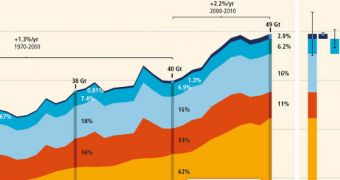Experts with the United Nations' Intergovernmental Panel on Climate Change (IPCC) have recently released a new report targeted at authorities and policymakers around the world. According to the conclusions of the new document, major action is required to reduce the influence and potential effects of global warming, and fast.
The current situation is already severe enough that the effects of global warming cannot be reverted. However, the report indicates, these consequences can be mitigated and kept under control as long as the international policy will exist to do so. The overarching goal is to keep climate change and its effects within acceptable levels, IPCC experts say.
According to previous studies, warming needs to be kept under 2 degrees Celsius (3.6ºF) compared to levels recorded before the Industrial Era, in order for its catastrophic effects to be kept in check. The world is already warming very fast year-to-year, so actions need to be taken immediately to prevent temperature levels from exceeding this value.
The IPCC argues that it is now technically possible to meet this goal, even though the process will not be easy. The most important thing we need to do is change our energy production and use pattern. These shifts have to occur rapidly and at a very wide scale, if the greenhouse gas (GHG) offsets are to work over the following decades. GHG are the gases responsible for producing global warming.
The report suggests that GHG emissions – including methane, carbon dioxide, and other dangerous chemicals – will have to be cut between 40 to 70 percent within the next three decades, and even more beyond that. By the end of the 21st century, our greenhouse gas emissions should be nearing zero, NPR reports.
Commentators say that this is unlikely to happen. Even though all countries know about global warming and the fact that it is caused by CO2 emissions in the atmosphere, the amount of GHG we have released over the past couple of decades has actually been increasing, as evidenced by the chart above. Between 2000 and 2010, emissions have increased faster than between 1970 and 2000.
Addressing global warming would require a shift to using wind, solar, nuclear, geothermal, and other types of alternative power. Huge funds should be allotted to studying energy efficiency improvement technologies, particularly for buildings and vehicles. Another important aspect would be to reduce deforestation and ocean pollution.
“That's not going to happen on its own. Public policies are going to be required. That's the key message. What's really striking and what's new about the report is that policy is addressed much more comprehensively than previously,” says Robert Stavins, an economist and climate agreement expert from the Harvard University, who was also a part of the IPCC group that authored the report.
“What this report means is that there are very key choices for governments and business and citizens to make, and that the timing of action is absolutely vital. If we wait, we will close off opportunities to avoid the impacts and we'll make it a lot more expensive,” says the director of climate and energy programs at the World Resources Institute, Jennifer Morgan.

 14 DAY TRIAL //
14 DAY TRIAL //